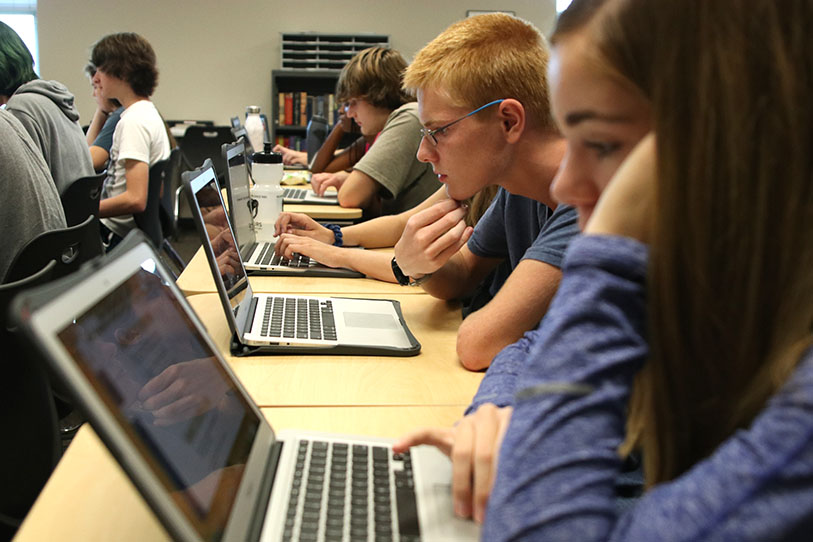School places restrictions on MacBook permissions
September 13, 2019
By Steven Curto
Taking his test in AP U.S. History on Tuesday, Sept. 3, junior John Lehan uses the application Canvas on his new MacBook.
One can always count on new policies to be accompanied by introductory rules and restrictions; the implementation of one-to-one computing via MacBooks is no exception. While the additional technology has created improvement opportunities inside the classroom, an array of MacBook restrictions have negatively impacted the student population.
White notes how MacBook restrictions have led to disgruntled students around the school.
“Word add-ons that we use for debate or other basic applications that people use [have been blocked],” White said. “I have friends that really want to work with Adobe products like Photoshop … in their classes, and they can’t.”
Specifically, White expresses frustration toward downloading restrictions on Dropbox and Verbatim that crippled the debate team’s ability to prepare for their season; after submitting requests for restriction removals, the problem still took weeks to be resolved.
“Specific programs that we use [to debate] can’t be used, so we’ve been set back two weeks, which is extremely detrimental [because] our first debate tournament is in a couple weeks,” White said. “We haven’t been able to even start [preparing] because the administration hasn’t approved anything.”
According to Mikel, in situations like the debate team’s, students and teachers are encouraged to directly approach administration if they wish to be exempt from downloading restrictions on software, programs or apps.
“[Requests for MacBook restrictions removals are] evaluated on a need basis,” Mikel said “If there was a restriction that a passionate student or group of students could prove a need for… then I would encourage [them] to approach [the] building principal… we value input.”
According to Mikel, students and teachers must show the value and necessity of the desired program or software through the means of proof and data. For example, debate teacher Sohail Jouya completed the software request process and proved a need for the desired programs, so the team now has access to vital software.
Despite initial issues like these, Mikel views the implementation of one-to-one technology as an overall success for the district.
“We’ve rolled out devices to five buildings, thousands of students and hundreds of teachers,” Mikel said. “If you really think about how much is involved with that, the problems that we’re having – even though they seem major at the time – in the grand scheme of things … they’re actually small [problems].”
Junior Sofia Nicot is disappointed by the restrictions on pre-installed Apple applications on the MacBooks. These include apps like Calendar, Messages, Mail, etc.
“The calendar [app] is an essential tool to keep kids organized and have all their dates in one [place],” Nicot said. “Especially on the MacBook, having [apple apps] restricted is definitely an issue.
According to technology director Brandon Riffel, application restrictions like Calendar have been put in place due to the district’s goal of helping students and faculty keep their personal data separate from district-owned devices for the sake of privacy. Riffel explains that the way iCloud functions, when someone logs into their Apple ID on a new device, “[Apple tries] to be helpful, and it wants to put messages back on all devices, so all [personal] messages go everywhere.” The solution was to black all applications connected to Apple ID, but by blocking iMessages and FaceTime, the access of other Apple applications such as Calendar also get restricted.
“The problem is [that if you add] Apple ID information to your MacBook because you want your calendar, your contacts and mail to show up on your phone … [so] you’re getting notifications up there, which kind of defeats the purpose [of restricting iMessages and FaceTime]. If someone sends you an inappropriate text message, it pops up in the notification,” Riffel said. “[The district is] working with Apple to help split [iMessages and apps like Calendar] apart so you can put your calendar, contacts, to do list–all of these things that we all live with–on your device.”
While these Apple applications are still under restrictions, Riffel notes that the internet allows you to access the Cloud and the student Office 365 account no matter what.
“If you need your calendar, contacts or mail, you can use the [internet]; iCloud.com works no matter what. Likewise, you have an Office 365 account which has a calendar, contacts and email built into Outlook,” Riffel said. “So, instead of using your personal email address for your school calendar, use the school calendar and put it on your personal device.”
